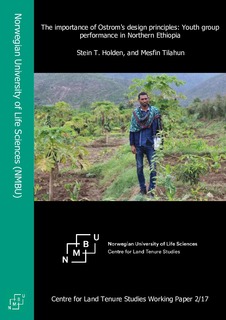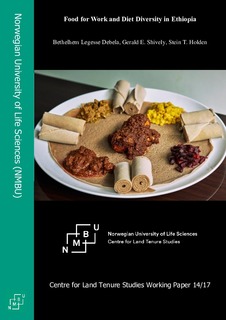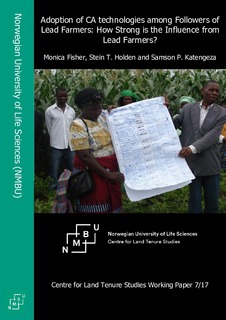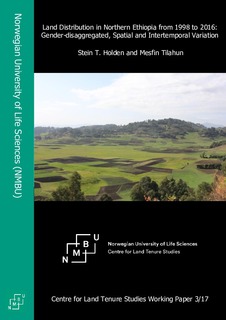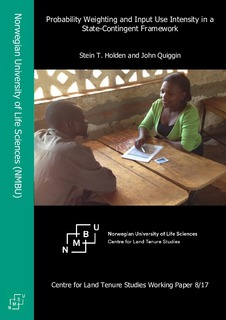Location
The Centre for Land Tenure Studies was opened at the Nowegian University of Life Sciences (NMBU) on the 27th of June 2011 resulting from a joint initiative by researchers at the Department of International Environment and Development (Noragric), the School of Economics and Business, and the Department of Landscape Architecture and Spatial Planning. In 2012 was joined by the Department of Ecology and Natural Resource Management.
Mission
The Centre for Land Tenure Studies (CLTS) at NMBU is established to further the study of land tenure. Land tenure studies define a broad and complex field of study cutting across many disciplines. For CLTS this entails, but is not limited to, the following activities:
- Provide a common arena for discussing land tenure issues, including a series of seminars directed to present new research or important theoretical perspectives. This may be designed as part of an educational program.
- Promulgate a joint series of working papers.
- Support international publication of articles and books.
- Develop and conduct joint courses at both Master and PhD level.
- Initiate and support exchange of researchers.
- Participate in research networks related to land tenure.
- Maintain a public list of collaborating institutions and researchers.
- Initiate and develop applications for research funds to support basic research on land tenure both by our own efforts and in collaboration with other research groups working on land tenure questions.
In its activities the centre will use English as its working language as far as practically possible. In short we may say that the mission of the Centre for Land Tenure studies is to enhance collaboration across departments at NMBU; to strengthen the visibility of NMBU activities within the field of land tenure; to strengthen NMBU’s international collaboration and networks within the field; to contribute to research and knowledge generation on land tenure issues; to help build capacity in the South and in Norway within the field; to disseminate policy lessons, and to contribute to policy debates.
Resources
Displaying 26 - 30 of 67The importance of Ostrom's design principles : youth group performance in Northern Ethiopia
Youth unemployment and migration are growing challenges that need more political attention in many countries, particularly countries with rapid population growth and economic transformation. Proactively mobilizing the youth as a resource in the creation of sustainable livelihoods can potentially be a win-win-win solution that Ethiopia is currently attempting. The new youth employment strategy includes allocation of rehabilitated communal lands to youth groups.
Food for work and diet diversity in Ethiopia
We use four waves of panel data from Northern Ethiopia to investigate the link between Food for Work (FFW) participation and the diversity of food consumption and production. Food-based transfer programs have become a standard tool for addressing the problem of chronic food insecurity in developing countries. Such programs have the potential to expand diet diversity if food items provided under FFW are not part of the beneficiaries’ staple diet. By raising effective incomes, cash payments also have the potential to “crowd in” purchases of nutritionally important foods.
Adoption of CA technologies among followers of lead farmers : how strong is the influence from lead farmers?
This study investigates how the Farmer-to-Farmer-Extension (F2FE) system with lead farmers and follower farmers influences adoption of Conservation Agriculture (CA) technologies in Malawi. Using data from 180 lead farmers and their 455 followers in central and southern Malawi, we assess the level of influence lead farmers have on their followers’ familiarity with and adoption of CA.
Land distribution in Northern Ethiopia from 1998 to 2016 : gender-disaggregated, spatial and intertemporal variation
This study utilizes land registry data from the First and Second Stage Land Registration Reforms that took place in 1998 and 2016 in sampled districts and communities in Tigray region of Ethiopia. Tigray was the first region to implement low-cost land registration and certification in Ethiopia and providing household level land certificates in the names of household heads. Second Stage Land Registration and Certification (SSLRC) is scaled up since 2015 and provides households with parcel-based certificates with maps. The SSLR&C lists all holders of parcels by name and gender.
Probability weighting and input use intensity in a state-contingent framework
Climate risk represents an increasing threat to poor and vulnerable farmers in drought-prone areas of Africa. This study assesses the fertilizer adoption responses of food insecure farmers in Malawi, where Drought Tolerant (DT) maize was recently introduced. A field experiment, eliciting risk attitudes of farmers, is combined with a detailed farm household survey. A state-contingent production model with rank-dependent utility preferences is estimated.








